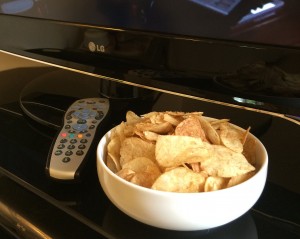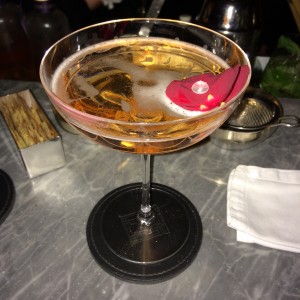Here’s a question for you: what do Pavlov’s dogs, a bag of crisps and the theme tune to “The Bill” all have in common? The answer is what psychologists call “classical conditioning” or, in this case, an acquired bad habit.
I was recently home visiting family, when my mother made an interesting point. A few years ago, she had been doing some evening housework and was about to finish when police series “The Bill” started on the TV.
Ever a crime and a cheeky crisp lover, and starving after her efforts, she thought that she would grab a quick bag of salt and vinegar, and watch the programme. The result was satisfying to both her savoury and sleuthing tastes.
A week later, the same situation arose and, remembering her earlier pleasant experience, she tucked into some crisps as the well-known theme tune began. A nifty second bag followed as the hour-long drama unfolded.
So it went on: the crisps became a regular snack with a regular viewing. Then, a few months later, she discovered that not only did she know the main characters better than some relatives but she had also gained an unwelcome half a stone.
Surprised, as she is an active person with a generally healthy diet, she analysed her routine. Then the familiar opening tune began, and she immediately started craving salt and automatically headed off to the kitchen.
There and then she decided to cut out the crisps – and her weight returned to normal within a few weeks. She was stunned: how could a few crisps make such a difference? Her body was more finely tuned than she had thought.
The fact is we are all creatures of habit, good and bad. As Russian scientist Ivan Pavlov discovered a century ago, our brain can be “hard wired” to associate closely timed experiences.
After realising that the sound of a bell heralded the arrival of their food, Pavlov’s dogs began to salivate at the sound of the bell alone. Or, in my mother’s case, The Bill alone.
Thoroughly unimpressed at being compared with a drooling mongrel, she still made the connection and, admirably, acted upon it. The theme tune had been her prompt to dive into the treat tin (which was binned soon afterwards. Nothing controls my mother).
Everyone has their guilty pleasures that, in moderation, make life worth living. Yet perhaps many of our excessive habits could be reduced or cut out altogether by changing the associated event or long-held pattern.
Coffee breaks and cigarettes, tea and biscuits, curry and beer, sofa and television, the tube home and a take-away are but a few, and everyone has their own. Or perhaps it is a certain person that helps to lead you astray!
Now no one is suggesting that you break up friendships or go cold turkey, though removing anything addictively harmful, like cigarettes, can only be a good thing. But in weight loss, health and self-esteem terms, a little self-discipline goes a long way. As we heard, just a couple of extra packets of crisps each week can make a big difference.
Perhaps make your cheeky evening glasses of wine a weekend tipple, or turn a nightly take-away into a three-times-a-week and then a once-a-week pleasure. Put a couple of biscuits on a plate with your tea, rather than the whole packet and grazing through the lot. Then make some of those biscuits oat-based rather than processed. Evolution, not revolution, is key.
When we were kids, our grandparents brought us treats on a Saturday, which we really looked forward to. Perhaps make Saturday or Sunday your regular “sin day” on which to indulge your particular pleasure, be it a cooked breakfast, take-away, chocolate, or sweet treat.
Over time, give these a progressively healthier twist, such as a grilled breakfast, Japanese food or vegetable curries, carob or dark chocolate, and homemade sugar-free cake. Or just a little less each time, like sugar in tea or coffee. Additions like sweeteners, salt and vinegar – and the amount we use – are often as much a habit as a preference. Very soon, you might well be doing without.
A little rationing becomes a way of life, as does making health a habit. Treats are anticipated, appreciated, and much less harmful – rather than daily poisons that may be steering you headlong towards obesity, diabetes and arteries like bacon rind.
Just a little bit of what you fancy does you good. And the anticipation makes it all the sweeter. Isn’t that right, Fido?



Comments are closed.